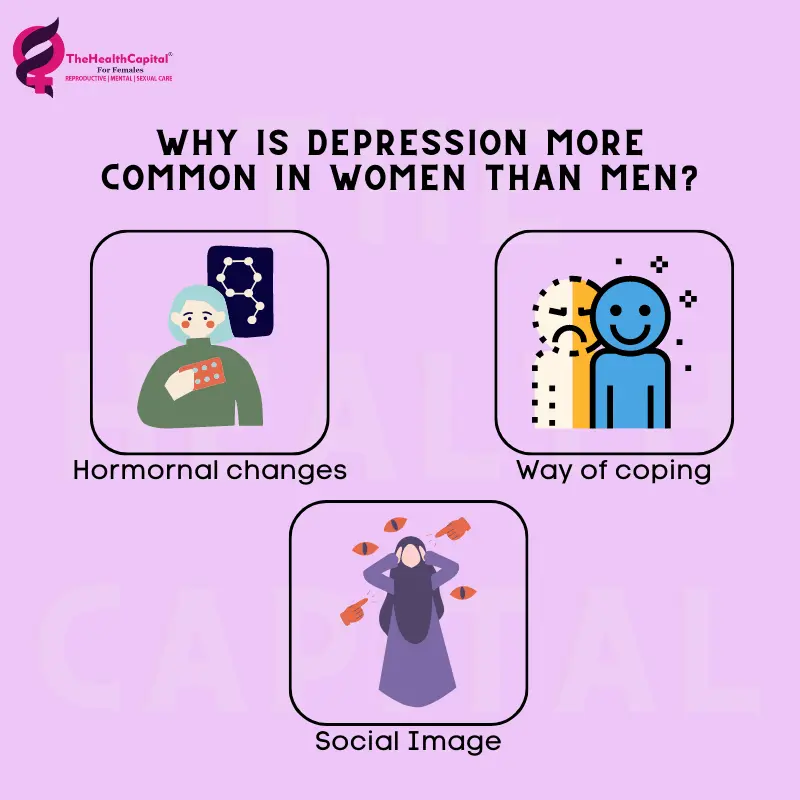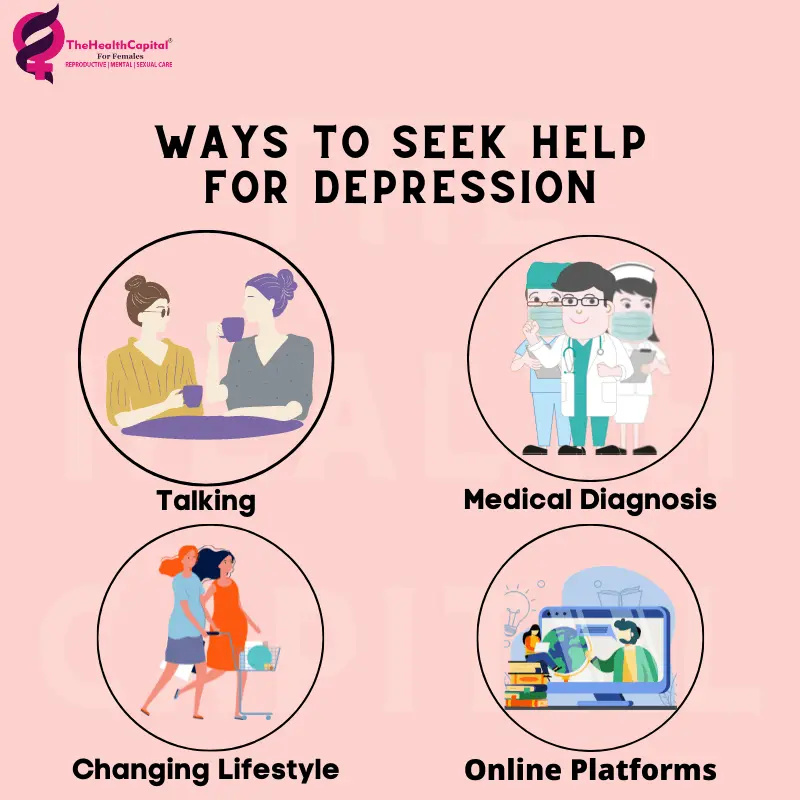Although gender bigotry is evil when it comes to mental health issues, some studies and statistics have shown that women are more than twice as likely to be in depression. It is not an easy affair to talk about mental health issues where standards and obligations are to be fulfilled. There are various ways in which women face depression. Oftentimes, they can’t even figure out if they are going through depression. Even if they do, they don’t speak up because of the judgments that live and breathe in the nooks and corners of society.
The Health Capital brings this blog to explain problems of depression in women and its multiple aspects, to spread awareness about this existing and growing situation, and to make sure that more and more women get knowledge about this issue. This would help them to assess their mental health which also leads to the degradation of physical health and interferes with their daily lives.
What is Depression?
Depression is a mental illness and a mood disorder that needs to be taken seriously. It is a mental health issue that needs to be talked about. It is associated with several negative feelings, eventually affecting the way you think and act. It arises from multiple reasons, like some traumatic experiences, neglected feelings, avoiding hurt, etc. Feelings of apathy, hopelessness, disconnect, and an unending sadness are quite common.
Women can face depression ranging from mild to severe. Self-help and self-care can help in the case of mild depression. However, medical assistance is necessary in case of severe depression with self-care.
Causes of Depression in Women
Multiple causes can lead to mental illness issues. It can be as simple as “just feeling disconnected” from something traumatic. Whatever the reason, these reasons must not be compared with each other. Comparison brings in deteriorating feelings, and this sense of “my reasons are not enough to validate my feelings” ultimately results in women not seeking help. Some of the most common signs of depression in women are:-
- Traumatic experiences that have adversely affected your mind and not dealing with the repercussions of that event in a proper manner can lead women into the pit of depression. For example, heartbreak or losing a loved one has shown many women unable to get out of the grief that came to them during the time of the incident.
- Loneliness plays another major reason why women feel negative emotions. Not being able to express your feelings to people is one of the major signs of depression in women. It stops them from speaking out about their issues and truly allowing themselves to heal. Not having people to reach out to is a factor that runs along the same lines.
- Postpartum Depression is also another reason that women who are expecting aren’t usually prepared for. This is the depression that happens after giving birth and in many places, women don’t speak about it for the fear of judgment. They think they are failing in their responsibilities and if they try to voice it out, they will face judgment and criticism.
- Body image and the beauty standards set up by society are other contributing factors. Many women hate their bodies which leads them to lose faith in themselves, their identities, and their thoughts. They lose confidence in themselves. This results in high-grade anxiety too, making women feel not just conscious about their bodies but cautious about themselves.
- When young minds are neglected by parents and friends, it hurts one’s mental health. This makes women not able to assess their feelings. Most of the time, women in depression are females who have not healed their inner child.
- Other stressful events might play a significant role in increasing levels of depression in women. Hectic work or some issues at certain places like discrimination makes women slip under the veil of depression.

Types of Depression in Women
While it might seem like a monotonous mental health issue, depression has various spectrums and aspects that must be assessed. It is important to understand that depression is a mental illness that has various types and aspects.
Major Depression
Major depression is a severe form of depression where a woman loses her ability to find pleasure in activities once considered enjoyable. She loses interest in everything and finds no enthusiasm in anything. It’s close to giving up on everything.
Postpartum Depression
This is a special form of depression that occurs after the birth of a baby – often referred to as the “baby blues”. It occurs due to the unexpected responsibility that accompanies the delivery of a baby.
Persistent Depressive Disorder
This type of depression is a milder form of depression. It is an extended depressed mood. It may last for two years or more. Major depressive episodes (i.e. severe forms of depression) may take place.
Premenstrual Dysphoric Disorder
This kind of depression is tied to a woman’s menstrual cycle. In this form of depression, negative thoughts, severe mood swings, and other pessimistic feelings occur a week before a woman gets her period. As soon as her period arrives, these thoughts vanish.
Signs of Depression in Women
Misdiagnosis of a mental illness is a common problem in today’s world. Many people have started treating mental health issues as a trend to stay “relatable” with society. Therefore, to avoid the misdiagnosis of any problem, it is imperative that every individual, not just women, understand the signs that could help differentiate whether you’re “just sad” or “depressed”. Some of the symptoms of depression in women are:
- Feelings of emptiness start overtaking your mind and body, coupled with loneliness.
- Enthusiasm levels go down resulting in losing interest in almost every activity you loved doing.
- Another major condition that accompanies one’s mind while going through depression is derealisation (a sense of disconnect from surroundings and people).
- Another major sign is the inability to concentrate on anything, even on simple day-to-day tasks like brushing, cooking, etc.
- Crying over any little matter or any minor issue, because it makes you overwhelmed.
- Sleep schedule starts getting affected adversely: sleeping too much or sleeping too little (insomnia).
- There are physical signs too like headaches and chest pains. Anxiety attacks and panic attacks are common signs of depression.

Why is Depression More Common in Women than Men?
Depression becomes a major factor that interferes in women’s lives a bit more than men’s lives because of the social, economic, and psychological factors that are present. For instance, the unimaginable beauty standards set up by society and the kind of discrimination women have had to face for centuries. Therefore, this mental illness is more common in women than men because of the following reasons.
1. Hormonal Changes
Given that the highest point of depression in women intersects with the time of their reproductive years (between the ages of 25 to 44 years of age), hormonal risk factors may play a significant role in women experiencing depression problems more than men. Estrogen and progesterone are known to affect neurotransmitter, neuroendocrine, and circadian systems that have been implicated in mood disorders.
2. Social Image
It is evident that women are often told to be soft-spoken, nurturing, and well-behaved toward people. They must fit in society’s shell and have the perfect image with the perfect demeanour. However, males are expected to be more outspoken and independent, both financially and socially. Therefore, it makes them a bit more outspoken about their personalities and feelings in comparison to women.
3. Way of coping
Many studies have identified differences in the way women and men cope. Women use an emotion-focused, more ruminative way of coping —repeating and accumulating their problems in their minds. Men tend to use a more problem-focused, distracting-yourself coping style to help them forget their troubles. It has been noted from various studies that the style of coping that women use takes more time than the one used by men.
Ways to Seek Help for Depression
Now that we have discussed the problems, signs, and causes of depression, it would be unfair and pessimistic to leave our readers with these negative aspects. Depression is not the end. It can be cured. The symptoms of depression in women can be healed. The process might not be easy, but worth it in the end. Some steps that can be included in the treatment of depression in women are:-
• Talking: Most of the time, people don’t have someone to talk to about their issues. Even if they do, they tend to use silence and a reserved approach toward their issues. However, talking about your issues to someone you can trust and rely upon can help a lot. It can help you release your emotions.
• Changing Lifestyle: Studies and practical experiences have shown that making a few alterations, or changes or simply removing some things from your lifestyle tends to be more effective in healing. For example, meditation and exercise can help reduce anxiety and make you achieve peace.
• Medical Diagnosis: For those who have severe depression signs and issues, medical diagnosis, psychotherapy, and stress management are ways through which you can cope with depression.
• Online Platforms: Many online platforms can help one in healing depression. The pandemic provided many ways through which people from the comfort of their homes can reach out for help. For instance, 7Cups is a good site for teenage girls and adult women to reach out for help.

How can The Health Capital Help Women?
The Health Capital understands and provides a free mental health diagnosis test for the treatment of depression in women. It has female psychologists and psychiatrists who can empathize with women needing help and provides a comfortable space to help them with their issues. It understands how this world can be a place where talking about mental health issues can be challenging.
Therefore, The Health Capital simply wishes to put forward a platform through which women can express, analyze and reach out for help. It wants to make a better and more comfortable space for women.
FAQ’s
1. Which age group is most affected by depression?
The age group that is affected by depression is 18–29 (21.0%), followed by those aged 45–64 (18.4%) and 65 and over (18.4%), and lastly, those aged 30–44 (16.8%).
2. Can nutrient deficiencies cause depression?
Studies have shown that long-term deficiencies of magnesium, B12 and Vitamin D can increase low mood, insomnia, and depression.
3. What are some of the major psychiatric disorders that can be linked with depression?
Some of the disorders that can be associated with depression are anxiety disorder, PTSD, bipolar disorder, and many others. All of these conditions and illnesses adversely affect mental health.
4. Is it true that depression can be genetic?
Yes, some studies have shown that depression in women can be traced back to a genetic link. Almost 40% of women who suffer from depression have been genetically depressed.
5. What causes depression in women?
1. Loneliness
2. Traumatic experiences
3. Body image
4. Stressful events6. How does depression affect a woman’s body?
1. Feelings of emptiness
2. Losing interest
3. Inability to concentrate
4. Anxiety attacks and panic attacks7. What physically happens during the depression?
Physical symptoms include chronic joint pain, limb pain, back pain, tiredness, sleep disturbances, psychomotor activity changes, and appetite changes.

